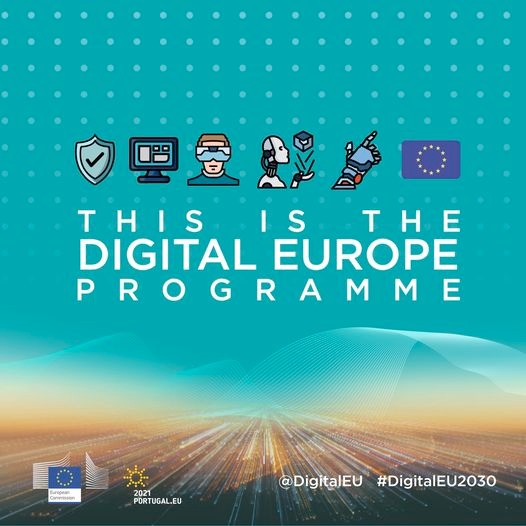Dr. Erjon Curraj – Digital Transformation Expert and Module Coordinator Jean Monnet
The European Union presented its vision for the Digital Decade of Europe for 2030. Europe aims to empower businesses and citizens towards a human-centered, sustainable and prosperous digital future for all. In one event two days online (June 1 and 2) unveiled not only the vision, but also the concrete objectives of EU countries related to digital transformation taking into account the radical changes in the post-COVID19 conditions in society, economy, education, health and all areas of life. I attended this event with a lot of curiosity and interest and had the opportunity to invite my students within the Jean Monnet Module supported by the Erasmus + Program to become part of a large online agora where it was reflected on the impact of digitalization and how prepare governments and other social actors.
The EU vision for the digital decade 2030 is based on four main pillars: Skills, Governments, Infrastructure and Business. In terms of skills, the EU aims to have around 20 million Information and Communication Technology specialties by 2030 promoting the participation of girls and women in ICT and at least 80% of the EU population to have basic digital skills. Second, as far as governments are concerned, the focus is on the digitalization of public health with the aim that by 2030, 100% of services will be online and 100% of citizens will have access to e-health. Another objective is for 80% of EU citizens to use digital identity. While in terms of infrastructure, the focus is on the 5G network for all and gigabit for all as well as increasing the EU’s weight in the production of advanced technology services as well as the security of the entire digital infrastructure. The EU intends to build the first computer with quantum accelerators. Fourth, in terms of digital business transformation, the EU aims that by 2030, 75% of EU companies will share Cloud / AI / BigData and support start-ups and double investments for EU Unicorns. In terms of small and medium-sized enterprises (SMEs), the EU aims for at least 90% of them to have a basic level of digital intensity.
During the event, fundamental questions were posed and discussed such as What should be the future of digital in Europe? What should be our 2030 goals when it comes to digital transformation? How can we make sure we meet our human-centered goals?
What was of great interest during the presentation event # EUDigital2030 it had to do with the reflections of various actors (policy makers, entrepreneurs, civil society, academia) about the impact of digitalization and Artificial Intelligence focusing on digital citizenship, ie the principles and rights of citizens in the digital world. The EU is building a framework of digital principles that will help promote and uphold EU values in the digital space.
First, digital rights include elements such as: Freedom of expression, including access to a variety of information, reliable and transparent; Freedom to set up and run an online business; Protection of personal data and privacy; Protecting the intellectual creation of individuals in the online space. While digital principles include: A secure and reliable online environment; Universal digital education and skills; Access to digital systems and equipment that respect the environment; Citizen-centered accessible public services; Ethical principles for human-centered algorithms; Protecting and empowering children in the online space; Full access to digital health services.
These principles and rights should guide governments, businesses and other actors in building various digital services or solutions as well as serve to monitor the impact of digitalization taking into account the negative effects or risks associated with advanced technologies such as AI ( Artificial Intelligence).
Thus, in implementation of this vision for 2030, it was introduced Digital Program for Europe (DIGITAL) as a new EU funding program of around € 7.5 Billion that brings digital technology to businesses, citizens and the public administration for services. This program will address the challenge of how Europe can become greener and more digital in this decade by 2030.
Despite the fact that Albania can not be compared in this respect with the EU or member states, I think that such a discussion and reflection is needed in Albania as well. In conditions when digital technology and advanced technological infrastructures play a critical role in our private life, but also in business, education, health, transport and public services as well as in any other field, we need a common vision for these developments that are occur rapidly. Also, given the digital transformation accelerated by the COVID-19 crisis and Albania’s goal of integration into the European Union, we as a society must engage in dialogue and action about the digital future for the new generation. Albania’s National Strategy for the Information Society and Digitalization was completed in 2020 and so we are in a good moment to start this process. The academy, civil society, media, business and government must come together in a policy-making dialogue to outline the vision for Albania’s digital future, linking it to the EU Agenda; and the impact that digitalization has on considering risks and opportunities.
As Coordinator i Module Jean Monnet for the promotion of the EU Digital Agenda in Albania, as a lecturer, as a digitalization expert and together with other colleagues from SCiDEV and other professional organizations and networks in Albania, we are working to promote digital rights and digital capabilities for different age groups and to build collaborations, synergies and dialogue about digital transformation and its impact on the economy, society, education, health and other areas. This is an invitation for all actors who have a role and interest in this regard to build bridges of communication and cooperation for the Digital Agenda of Albania towards 2030. / PCWorld Albanian






